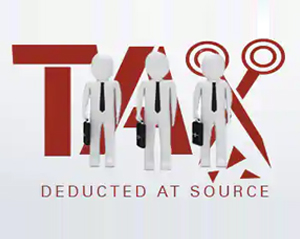What is indirect tax?
Indirect tax is the tax levied on the consumption of goods and services. It is not directly levied on the income of a person. Instead, he/she has to pay the tax along with the price of goods or services bought by the seller. The person paying the tax to the government and the person bearing the liability to pay the tax are thus, two different people.
Let’s look at an example to understand how indirect tax works. The indirect tax rate here has been assumed to be 10%.
| Particulars | Mr X, the manufacturer | Mr Y, the retailer |
|---|---|---|
| Selling price | ₹ 1,000 | ₹ 1,100 |
| Tax @ 10% | ₹ 100 | ₹ 110 |
| Selling price with tax | ₹ 1100 | ₹ 1210 |
| Taxes paid on purchase | ₹ 0 | ₹ 100 |
| Total tax to be paid to the government | ₹ 100 | ₹ 10 |
As seen in the above table, Mr. X will collect taxes of ` 100/- on the selling price of ₹ 1,000/-, from Mr. Y. Mr. X has not paid any taxes earlier. So he will pay the entire ` 100/- collected to the government.
Mr. Y will then sell the goods to the customer at ₹ 1,100/- plus 10% taxes i.e. total selling price is ₹ 1210/- for Mr. Y. Since Mr. Y has already paid taxes of ₹ 100/- to Mr. X, he will only pay the balance ₹ 10/- (₹ 110/- – ₹ 100/-) to the government.
Hence, the government has received a total tax of ₹ 110/- (₹ 100/- from Mr. X and ₹ 10/- from Mr. Y). The customer has paid ₹ 1210/- to Mr. Y which is bifurcated as ₹ 1100/- selling price and ₹ 110/- of taxes. It is thus ultimately the customer who is bearing the entire tax liability on the goods purchased.
Different types of indirect taxes in India
Earlier, different types of indirect taxes were imposed as follows:
- Service Tax: This is charged on the services availed by the customer. For example, if the person books a hotel accommodation, service tax is charged on the hotel booking amount.
- Excise Duty: This is paid for the manufacturing of goods. For example, if a person manufactures cars, he is liable to pay excise duty on manufactured cars.
- Value Added Tax (VAT): This is paid on the value addition in price during the sale of goods. For example, when the wholesaler sells goods to a retailer.
- Custom Duty: This is paid on the goods imported from outside India.
- Stamp Duty: This is paid on the sale of immovable property. Also, stamp duty is mandatory on all types of legal documents.
- Entertainment Tax: This is levied on every transaction related to entertainment. For example, movie tickets, video game arcades, stage shows, exhibitions, amusement parks, and sports-related activities.
Features of indirect tax
Streamlined tax liability
Proper implementation of indirect taxes ensures a streamlined tax system. The customer pays tax for the product or service purchased. The seller or manufacturer collects this tax and forwards it to the government.Progressive nature
With better implementation of uniform taxes across the country, indirect taxes are progressive and offer several benefits to buyers, sellers, and the government. It has reduced confusion or overlapping. Tax frauds have also been reduced.Reduced tax evasion
Since taxes are now directly implemented on the sale and purchase of goods and services, tax evasion has been reduced. This makes the administration and collection of taxes transparent.Savings and investment
One of the salient features of indirect tax is its direct impact on your savings and investments. When indirect taxes are imposed on specific goods or services, you may choose to allocate funds towards saving or investment options instead of spending them on taxed products. This can be an indirect way to enhance your savings or investing.Charged at the point of sale
Point of sale refers to the location where a transaction takes place. It is typically where goods or services are exchanged for money, such as grocery stores, malls, movie theatres or websites. Indirect taxes are usually levied at the point of sale of goods or services. This means that the tax is included in the price of the product and paid at the time of purchase. The seller is responsible for collecting and submitting the tax to the Government.Broader social coverage
One of the most striking features of indirect tax is that it has a much broader social coverage compared to direct taxes. This means that more people are liable to pay indirect taxes than direct taxes. This is because they are directly applied to the price of a product or service. Moreover, they are applied to a wide range of goods and services, which ensures that taxpayers across different income levels contribute to it.
Advantages of indirect tax
Below are some advantages of indirect tax:
Stability in revenue
Indirect taxes in India offer the Government a stable and consistent source of revenue as they are collected directly at the point of sale. This provides a reliable way for the Government to earn revenue. Additionally, since indirect taxes are levied at the point of sale, all taxpayers, regardless of their income tax slab, contribute to the growth of the economy. This broadens the revenue base and enhances the country's overall financial stability.Reduced tax evasion
Another advantage of indirect taxes is their effectiveness in reducing tax evasion. Since indirect taxes are added to the price of the product and are collected directly at the point of sale, it makes it difficult for taxpayers to evade tax.Broad revenue base
Indirect taxes in India contribute to a broader revenue base by ensuring that all consumers contribute to the economy's growth regardless of income level or tax bracket. This promotes equal tax distribution and spreads the tax burden across the population.
Disadvantages of indirect tax
Below are some disadvantages of indirect tax:
Reduced consumer spending
One significant drawback of indirect taxes is their potential to reduce consumer spending. When taxes are levied on certain goods or services, one may opt to spend less on those products to avoid paying the associated tax. This can lead to a decrease in overall consumer demand for some items and affect businesses that manufacture or sell these products.Unpredictable revenue
Indirect taxes in India can result in revenue unpredictability for the Government. Changes in demand and economic conditions can lead to unpredictable income for the Government. This unpredictability can pose challenges for the Government, making it difficult for them to meet their goals effectively.Impact on basic necessities
Another disadvantage of indirect taxes in India is their potential impact on basic necessities. Taxes on essential goods and services, such as food, medicine and utilities, can affect lower-income groups. High taxes on basic necessities can lead to increased financial strain on vulnerable sections of the society. They can also lead to more significant inequalities between the rich and the poor.
People like you also read ...







